|
|
|
Sort Order |
|
|
|
Items / Page
|
|
|
|
|
|
|
| Srl | Item |
| 1 |
ID:
068944
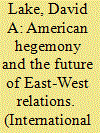

|
|
|
| 2 |
ID:
108846
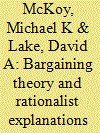

|
|
|
| 3 |
ID:
134496
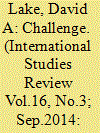

|
|
|
|
|
| Summary/Abstract |
Economic and political power within the international system is becoming more diffuse. Nonetheless, China is today the principal challenger to the United States (Mansfield, this issue). The European Union (EU) remains an economic powerhouse, but is currently plagued by problems centering on the euro and the austerity Germany and the fixed exchange rate regime have imposed on the continent. Europe has also shown little interest in challenging the United States in past decades and, in fact, has been a stalwart supporter of American hegemony for nearly 70 years. Japan remains the world's third largest economy and fourth largest trader, and after decades of stagnation may finally be on the road to economic recovery. Yet, it too remains a supporter of continued American leadership. Brazil, Russia, and India have garnered much attention recently but still rank low on the scale of economic power, whether measured by GDP or trade (Mukherji, this issue). China is the world's second largest economy and largest trader. By any measure, it is the only country likely to overtake the United States in the near future, although its ability to do so is not a foregone conclusion. The distribution of international power may soon return to bipolarity.
|
|
|
|
|
|
|
|
|
|
|
|
|
|
|
|
| 4 |
ID:
178549
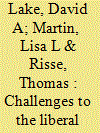

|
|
|
|
|
| Summary/Abstract |
As International Organization commemorates its seventy-fifth anniversary, the Liberal International Order (LIO) that authors in this journal have long analyzed is under challenge, perhaps as never before. The articles in this issue explore the nature of these challenges by examining how the Westphalian order and the LIO have co-constituted one another over time; how both political and economic dynamics internal to the LIO threaten its core aspects; and how external threats combine with these internal dynamics to render the LIO more fragile than ever before. This introduction begins by defining and clarifying what is “liberal,” “international,” and “orderly” about the LIO. It then discusses some central challenges to the LIO, illustrated by the contributors to this issue as well as other sources. Finally, we reflect on the analytical lessons we have learned—or should learn—as the study of the LIO, represented by scholarship in International Organization, has sometimes overlooked or marginalized dynamics that now appear central to the functioning, and dysfunction, of the order itself.
|
|
|
|
|
|
|
|
|
|
|
|
|
|
|
|
| 5 |
ID:
156804
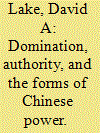

|
|
|
|
|
| Summary/Abstract |
The debate about China’s rise and future United States–China relations has focused on the purpose to which China’s growing international power will be put. This article focuses on the form of China’s power, distinguishing between domination and authority. Different great powers have, at different times, chosen one, the other, or more commonly differing mixes of the two forms. How China chooses now and in the future will have a significant effect on its relationships with other states, and through them on its relationship with the United States. The first section explores the differences between domination and authority as strategies for the exercise of international power. The second section summarizes a theory of authority with particular relevance to China today. Though necessarily speculative, this section identifies where China is most likely to choose one strategy over the other as its international influence expands. The final section examines the domestic impediments in China to the choice of authority. While both China and the United States might be better off in a world in which the former constructs an international hierarchy to parallel the latter’s, the conclusion draws a relatively pessimistic assessment of the prospects for cooperation between the two emerging superpowers.
|
|
|
|
|
|
|
|
|
|
|
|
|
|
|
|
| 6 |
ID:
160726
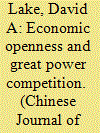

|
|
|
|
|
| Summary/Abstract |
The United States–China relationship is more likely than not to slide into economic and military competition, despite the perhaps best intentions of both states. This new bipolar competition is not inevitable. The key question is whether both governments have the self-restraint to limit domestic rent-seeking interests who will undoubtedly demand protection at home and exclusivity in their spheres of influence abroad. If not, the new superpowers will, like great powers in the past, ‘race’ for economic privileges that can quickly divide the world up into exclusive blocs. Like the security dilemma, great powers need not actually exclude one another from their economic zones; the fear of exclusion alone is enough to ignite the process of division. There was always some likelihood of a competitive economic spiral given China’s close business–government relations in a ‘state-capitalist’ economy. Now, for the first time in seven decades, there is a chance that the United States, in the grips of economic nationalism, might abandon its historic policy of free trade and ignite a new race for economic privilege as well.
|
|
|
|
|
|
|
|
|
|
|
|
|
|
|
|
| 7 |
ID:
080683


|
|
|
|
|
| Publication |
2008.
|
| Summary/Abstract |
Despite increasing attention, scholars lack the analytic tools necessary to understand international hierarchy and its consequences for politics and policy. This is especially true for the informal hierarchies now found in world affairs. Rooted in a formal-legal tradition, international relations scholars almost universally assume that the international system is a realm of anarchy. Although the fact of anarchy remains a truism for the system as a whole, it is a fallacy of division to infer that all relationships within that system are anarchic. Building on an alternative view of relational authority and recent research on the practice of sovereignty, a new conception of international hierarchy is developed that varies along two continua defined by security and economic relations. This construct is operationalized and validated, and then tested in a large-nstudy of the effects of international hierarchy on the defense effort of countries. The principal finding is that states in hierarchical relationships spend significantly less on defense relative to gross domestic product than states not in such relationships. In short, hierarchy matters and subordination pays; states appear to trade some portion of their sovereignty for protection from external security threats
|
|
|
|
|
|
|
|
|
|
|
|
|
|
|
|
| 8 |
ID:
057597


|
|
|
| 9 |
ID:
159477
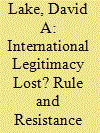

|
|
|
|
|
| Summary/Abstract |
The pillars of the Pax Americana are decaying. There are two critical challenges. Our interests with our closest allies have been drifting apart for decades, with increasingly serious consequences. A new populist and economic nationalist coalition has been mobilized in the United States, challenging the internationalist coalition that has prevailed at home since the second World War. These challenges are not the product of President Donald J. Trump. He is the manifestation of these challenges, not their cause. Understanding these challenges requires examining anew the role of international legitimacy and authority in world politics and recognizing that different international orders have different distributional consequences. This essay summarizes my past research on the incentives for international hierarchy, integrates the role of domestic interests into that theory, and explores the nature and role of international legitimacy in the study of world order. Part II examines the Pax Americana, and contrasts this order with those found in the Caribbean basin and Middle East. The final section outlines the changing incentives for cooperation between the United States and Europe, discusses the rise of populism in the United States, and suggests ways of addressing the current challenges to internationalism.
|
|
|
|
|
|
|
|
|
|
|
|
|
|
|
|
| 10 |
ID:
005658
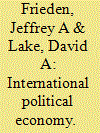

|
|
|
|
|
| Edition |
3rd ed.
|
| Publication |
London, Routledge, 1995.
|
| Description |
xv, 546p.
|
| Standard Number |
0415120470
|
|
|
|
|
|
|
|
|
|
|
|
Copies: C:1/I:0,R:0,Q:0
Circulation
| Accession# | Call# | Current Location | Status | Policy | Location |
| 036794 | 337/FRI 036794 | Main | On Shelf | General | |
|
|
|
|
| 11 |
ID:
001618
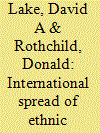

|
|
|
|
|
| Publication |
Princeton, New Jersey, Princeton University, 1998.
|
| Description |
xx,392p.
|
| Standard Number |
0691016917
|
|
|
|
|
|
|
|
|
|
|
|
Copies: C:1/I:0,R:0,Q:0
Circulation
| Accession# | Call# | Current Location | Status | Policy | Location |
| 041177 | 305.8/LAK 041177 | Main | On Shelf | General | |
|
|
|
|
| 12 |
ID:
124375
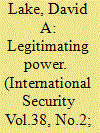

|
|
|
|
|
| Publication |
2013.
|
| Summary/Abstract |
The United States has maintained international hierarchies over the Western Hemisphere for more than a century and over Western Europe for nearly seven decades. More recently, it has extended similar hierarchies over states in the Middle East. How does the United States exercise authority over other countries? In a world of juridically sovereign states, how is U.S. rule rendered legitimate? Hierarchy has interstate and intrastate distributional consequences for domestic ruling coalitions and regime types. When the gains from hierarchy are large or when subordinate societies share policy preferences similar to those of the United States, as in Europe, international hierarchy is possible and compatible with democracy. When the gains from hierarchy are small and the median citizen has policy preferences distant from those of the United States, as in Central America, international hierarchy requires autocracy, and the benefits of foreign rule will be concentrated within the governing elite. In the Middle East, the gains from hierarchy also appear small, and policy preferences are distant from those of the United States. As a result, the United States has backed sympathetic authoritarian rulers. Although a global counterinsurgency strategy might be viable over the long term, the costs of establishing effective hierarchies in the region imply that the United States is better off retrenching "East of Suez."
|
|
|
|
|
|
|
|
|
|
|
|
|
|
|
|
| 13 |
ID:
099861
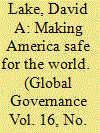

|
|
|
|
|
| Publication |
2010.
|
| Summary/Abstract |
Over the past century, the United States has built and sustained relationships of varying hierarchy over states in Latin America, Western Europe, and Northeast Asia. In recent decades, it also has attempted to expand its authority over other states into Eastern Europe, which has been met with a measure of success, and the Middle East, which has been far more problematic. The authority wielded by the United States over its subordinates, despite occasional abuses, provides security both internally and externally and permits unprecedented prosperity. Americans, in turn, gain from writing the rules of that order. The key foreign policy task today is not to diminish US authority, but to preserve its benefits into the future. To rule legitimately, however, requires tying the suzerain's hands. To secure the international order that has been so beneficial in the past century and to succeed in extending that order to countries that do not yet enjoy its fruits requires a new, more restraining, multilateral solution that binds the hands of the United States far more tightly than in the past.
|
|
|
|
|
|
|
|
|
|
|
|
|
|
|
|
| 14 |
ID:
084671


|
|
|
|
|
| Publication |
2008.
|
| Summary/Abstract |
The phrase "American empire" has reentered the popular lexicon but remains contested. What does it mean to say that the United States is an empire? Why has this term resurfaced after so many decades to describe the United States in the new millennium? What does this mean for American foreign policy? I attempt to answer these questions by making three interrelated points. First, empire is a particular authority relationship between two polities constituted by extreme forms of both security and economic hierarchy. Second, the United States today is not an empire but it does exert substantial authority over other states in a range of hierarchical relationships. Third, although not an empire, the United States is acting in an imperialist fashion and, paradoxically, is undermining the international authority that it has cultivated and nurtured over the last century.
|
|
|
|
|
|
|
|
|
|
|
|
|
|
|
|
| 15 |
ID:
087930
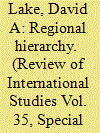

|
|
|
|
|
| Publication |
2009.
|
| Summary/Abstract |
The ordering principle of international relations varies widely across regional
security complexes and has profound effects on regional order. States form hierarchies over
one another based on relational authority, which itself rests on social contract theories that
posit authority as an equilibrium of an exchange between a dominant state and the set of
citizens who comprise the subordinate state. Regional orders emerge because of the strong
positive externalities of social order and economies of scale in its production, and the mutually
reinforcing legitimacy accorded the dominant state by local subordinates. This implies that
regions characterised by the hierarchy of single dominant states will possess more peaceful
regional orders. Regions often described as pluralistic security communities in which cooperation
is understood to have emerged spontaneously from anarchy are better described as
regional hierarchies in which peace and conflict regulation are the products of the authority of
a dominant state.
|
|
|
|
|
|
|
|
|
|
|
|
|
|
|
|
| 16 |
ID:
099102
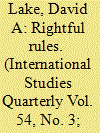

|
|
|
|
|
| Publication |
2010.
|
| Summary/Abstract |
Global governance is an important and increasingly popular topic of inquiry. Nonetheless, existing research remains too statist, privileging states and limiting other forms of governance to the interstices of state power. Drawing on social contract theory, I offer an alternative approach that begins with the central role of authority in political life and develops a synthetic understanding of governance that applies equally to its myriad forms. I argue that we have, as a discipline, relied on a formal-legal conception of authority that is inappropriate to an international setting and has unduly limited enforcement to violence. I propose that global governance and its many forms can be understood and unified by a concept of relational authority, which treats authority as a social contract in which a governor provides a political order of value to a community in exchange for compliance by the governed with the rules necessary to produce that order. This conception of relational authority is followed by three illustrations of its central logic in (i) state-to-state hierarchy by the United States over Caribbean states, (ii) supranational authority by the World Trade Organization over member states, and (iii) private authority by credit rating agencies over corporations and sovereign borrowers. The conclusion outlines the research agenda that follows from this approach.
|
|
|
|
|
|
|
|
|
|
|
|
|
|
|
|
| 17 |
ID:
101884
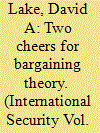

|
|
|
|
|
| Publication |
2011.
|
| Summary/Abstract |
The Iraq War has received little sustained analysis from scholars of international relations. I assess the rationalist approach to war-or, simply, bargaining theory-as one possible explanation of the conflict. Bargaining theory correctly directs attention to the inherently strategic nature of all wars. It also highlights problems of credible commitment and asymmetric information that lead conflicts of interest, ubiquitous in international relations, to turn violent. These strategic interactions were central to the outbreak of the Iraq War in 2003. Nonetheless, bargaining theory is inadequate as an explanation of the Iraq War. Although the problem of credible commitment was real, it could not be solved because of the prior beliefs of the Bush administration that Saddam Hussein was uniquely evil and because of Saddam's inability to signal accurately to multiple audiences, both factors now outside bargaining theory. Nor was the problem of private information an important impediment to bargaining; rather, the information failures observed in both Washington and Baghdad were of their own making as each formed self-deluding beliefs and expectations. Bargaining theory also ignores postwar governance costs and domestic interest groups, both of which contributed to the war. All of these problems require either considerable amendments to the theory or the revision of core assumptions. Drawing on this critique, the final sections draw out the analytic and policy lessons of the Iraq War and suggest, most importantly, the need for a new behavioral theory of war.
|
|
|
|
|
|
|
|
|
|
|
|
|
|
|
|
| 18 |
ID:
150524
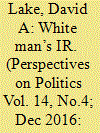

|
|
|
|
|
| Summary/Abstract |
Drawing largely on my own career in academia, I elaborate on the need for greater gender, racial and other forms of diversity in International Relations. Although theories are thought to be “objective,” what goes into those theories and, in turn, their explanatory power is ultimately shaped by subjective, lived experiences. Different individuals with different life stories will develop different intuitions about how the world “works,” and thus will write different theories to capture those intuitions and, in turn, larger patterns of politics. I explain here how my life experience as a privileged white male has shaped the intellectual contours of my work on international hierarchy. Building from this foundation, I then explore how professional practices elevate as gatekeepers individuals with generally similar life experiences and, thus, intuitions about what constitutes “good” work in the field, which in turn reinforces those professional practices and priorities. The final section focuses on problems of eroding the disciplinary hierarchy and broadening the pipeline into the profession.
|
|
|
|
|
|
|
|
|
|
|
|
|
|
|
|
| 19 |
ID:
096199
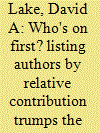

|
|
|
|
|
| Publication |
2010.
|
| Summary/Abstract |
Political science as a discipline lacks any convention on the order in which authors should be listed in co-authored publications. As a result, the order of authors' surnames currently provides no information to other scholars, hiring and promotion committees, and other reviewers about the relative contributions of each collaborator. This lack of information impedes the allocation of proper credit for scholarly contributions. Moreover, in collaborations between junior and senior colleagues, or other asymmetric status hierarchies, the absence of both information and any convention tends to favor more established scholars; this makes it more difficult for graduate students, untenured professors, and other vulnerable co-authors to negotiate for and receive appropriate credit. Listing authors by relative contribution is both more informative and fair. In publications where one author provides the necessary research funding, or a faculty member is not only a co-author but also a dissertation or other academic advisor, it is also appropriate to designate that collaborator as "last" or "senior author." In all cases, articles should carry a short statement indicating the division of labor between the co-authors, even or especially if the contributions are equal.
|
|
|
|
|
|
|
|
|
|
|
|
|
|
|
|
| 20 |
ID:
107812
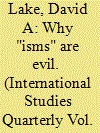

|
|
|
|
|
| Publication |
2011.
|
| Summary/Abstract |
This essay probes tensions between our professional practices and the quality of our professional output in the field of international studies. We organize ourselves into academic "sects" that engage in self-affirming research and then wage theological debates between academic religions. This occurs at both the level of theory and epistemology. Unfortunately, this academic sectarianism produces less understanding rather than more. Theoretically, we should focus on developing contingent, mid-level theories of specific phenomena. Epistemologically, we should recognize there are multiple valid and perhaps even complementary paths to understanding.
|
|
|
|
|
|
|
|
|
|
|
|
|
|
|
|
|
|
|
|
|